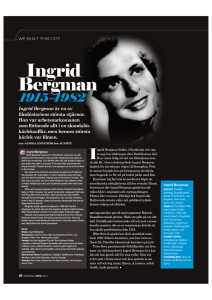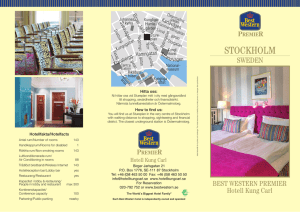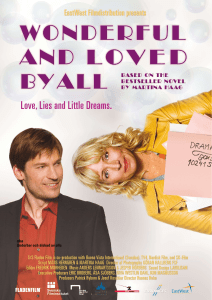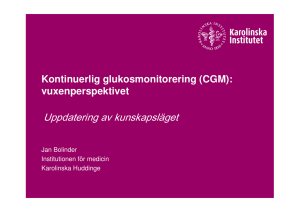hur beslut fattas
advertisement
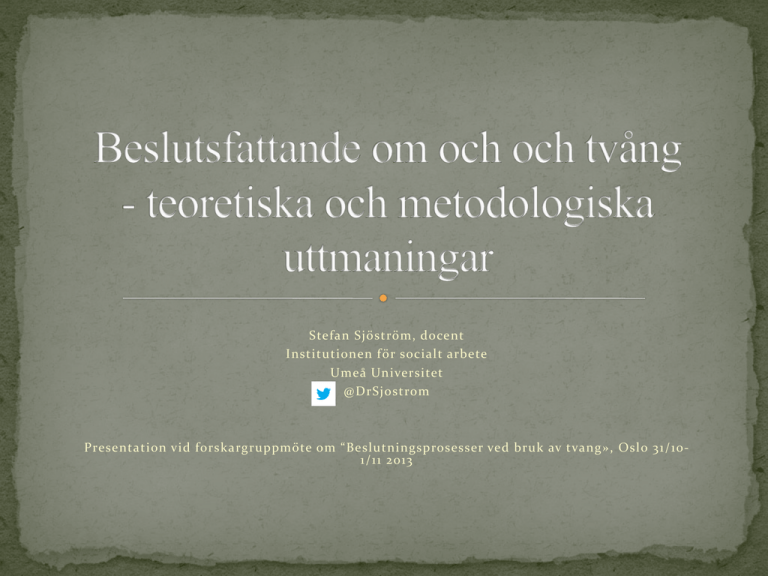
Stefan Sjöström, docent Institutionen f ör socialt arbete Umeå Universitet @DrSjostrom Presentation vid forskargruppmöte om “Beslutningsprosesser ved bruk av tvang», Oslo 31/101/11 2013 Ett val mellan alternativ? En kognitiv process? Något som händer före en handling? Något som händer efter en handling? Något som händer i ett visst ögonblick? En talhandling? Något som kan utvärderas? DIESFELD, K. 2003. Insights on "Insight". The Impact of Extra-Legislative Factors on Decisions to Discharge Detained Patients. In: DIESFELD, K. & FRECKELTON, I. (eds.) Involuntary Detention and Therapeutic Jurisprudence. International perspectives on civil commitment. Aldershot: Ashgate. FRECKELTON, I. 1998. Decision-making about involuntary psychiatric treatment: An analysis of the principles behind Victorian practice. Psychiatry, Psychology & Law, 5, 249-264. PEAY, J. 1989. Tribunals on Trial. A Study of Decision-Making under the Mental Health Act 1983, Oxford, Clarendon Press. MISHLER, E. & WEXLER, N. 1963. Decision processes in psychiatric hospitalization. American Sociological Review, 28, 576-587. ENGLEMAN, N., JOBES, D., BERMAN, A. & LANGBEIN, L. 1998. Clinicians' Decision Making About Involuntary Commitment. Psychiatric Services, 49, 941-945. UMBENHAUER, S. L. & DEWITTE, L. L. 1978. Patient Race and Social Class: Attitudes and Decisions among Three Groups of Mental Health Professionals. Comprehensive Psychiatry, 19, 509-15. KITAMURA, T. 2000. Assessment of psychiatric patients' competency to give informed consent: Legal safeguard of civil right to autonomous decision-making. Psychiatry Clin Neurosci, 54, 515-522. MEYNEN, G. 2013. A neurolaw perspective on psychiatric assessments of criminal responsibility: Decision-making, mental disorder, and the brain. International Journal of Law and Psychiatry, 36, 93-99. STEINERT, T., LEPPING, P., BARANYAI, R. & HERBERT, L. 2004. Ethical problems in decisions on coercive treatment. European Psychiatry, 19, 58S. SATTAR, S. P., PINALS, D. A., DIN, A. U. & APPELBAUM, P. S. 2006. To commit or not to commit: The psychiatry resident as a variable in involuntary commitment decisions. Academic Psychiatry, 30, 191 - 195. MILBURN, H. J. & COCHRANE, G. M. 1997. Compliance and concordance with treatment - Treating the patient as a decision maker is not always appropriate. British Medical Journal, 314, 1906-1906. RUDNICK, A. 2002. Depression and competence to refuse psychiatric treatment. J Med Ethics, 28, 151-155. Beslutsfattande är rationellt Beslutsfattande kan utvärderas Bör hanteras av experter Bör underkastas kontroll och utvärdering Kliniskt beslutsfattande Patienter och beslut om tvång Hur tvång påverkar beslutsfattande Rättsligt beslutsfattande Politiskt beslutsfattande Risken för patienter att tvångsinläggs påverkas av Clinician detention ratio In-house/mobile unit Availability of beds Patientegenskaper påverkade inte! ENGLEMAN, N., JOBES, D., BERMAN, A. & LANGBEIN, L. 1998. Clinicians' Decision Making About Involuntary Commitment. Psychiatric Services, 49, 941-945. ”Oracular reasoning” i bedömning Syntom tolkas med utgångspunkten att patienten är sjuk Avkontextualiserade beskrivningar Alternativa kontextualiseringar används sällan Kontext kan läggas till för att framställa beteende som sjukt During a round meeting at the admission unit, the patient Mariana Rintala is described as paranoid. The acting CP questions whether she really is paranoid. Nurse Jeanette says that she thinks that the patient is ”mega-paranoid” and the MHW Fredrig agrees, adding: - She’s an old schiz and she believes that someone is trying to poison her with gas and that the staff has peculiar plans. She opens the window to let in clean air and her room-mate thought it was cold in the room last night because the window was open. - Well, maybe she just wanted to get somefresh air? the CP suggests - No, she builds complete systems, Fredrik explains. - OK, the CP nods and the subject is dropped. Patienters beslutsförmåga Vi vet inte så mycket Patienters delaktighet Information till patienter Maximalt inflytande trots tvång Patienters upplevelse av inflytande Mindre fokus på att motivera patienter? Tvång som ”leverage” Tvångets effekter på patienters tillit Fynd Regionala skillnader (Norge, Sverige, USA, UK) Kliniska beslut ändras sällan Brister i granskning av medicinska beslut Juridiska experter agerar paternalistiskt Den nye domaren Patienten som trodde han var JFK HOLSTEIN, J. 1993. Court-Ordered Insanity. Interpretive Practice and Involuntary Commitment, Hawthorne, NY, Aldine de Gruyter. AP ställer inga frågor till CP i 9 av 26 fall Frågor fokuserar på patienten AP ställer aldrig genuint ifrågasättande frågor Fyra tolkningsrepertoarer Kollegial, avslöjande, terapeutisk och medlande JUDGE Bengt Rosenius, any questions? AP Yes, a little something. If you, Tina, or the relation between failure to medicate and relapse, is it clear, that is regular, in the way that it’s not xxxxx PUBL PARTY Yes, it is AP Yes. PUBL PARTY It is. And, this, the side effects that Tore are talking about, I don’t want to undervalue because there are obviously side effectsAP Mm. PUBL PARTY But, it, we do have different views about that, Tore and myself and my staff at Klockarlunden [a treatment home]. Because fact is that when he’s not medicated there are even more trouble with, spasms, and, and leg discomforts. AP Mm, mm. PUBL PARTY So then it’s really difficult. And his restlessness becomes very significant. And it is under such circumstances that he has lost his accommodation and, has had debts for rent and all these things that have made him live in a supervised home now. But he says that he’s just renting an apartment and that he’s also been given a trustee. AP Mm, mm. PUBL PARTY Yes. AP But it, the way, the way you’re describing things there is an association to the supervised home although that is a separate… PUBL PARTY Yes, precisely. AP xxx like xxxPUBL PARTY Yes. AP But there is staff there who… PUBL PARTY Yes. AP Eh… PRIV. PARTY There is no staff where I live. AP No, I was going, you’re, I will, am going to ask you questions too. In brief, is there any experience to your knowledge that, Tore has been without medication for an extended period of time and, in a manner of speaking, managed (.) reasonably? PUBL PARTY No. AP Is it a quick relapse if, if xxx xxx? PUBL PARTY Yes, it is, the relapse will be quick. AP And then we’re talking about quite florid psychotic episodes like you have described here? PUBL PARTY Yes, yes. We are. But Tore doesn’t believe that, that he is ill and thus doesn’t think he has any relapses. Because he just thinks that it’s better when it swings a little, when there’s a lot going on and … AP Mm, mm. PUBL PARTY And that’s how it is. Also, there’s been a lot of, a lot of betting on horses. But Tore doesn’t do that anymore. [looks at the public party, as if probing for confirmation] No. Lagstiftning blir ofta utgångspunkt för forskning I så fall måste lagarnas intentioner problematiseras Beslut om lagar är ett studieobjekt i sig Officiellt syfte Minska tvång underlätta övergång sjukhus->lokalsamhälle, Pragmatisk anpassning Långa permissioner -> ÖPT Politisk kontext Mordet på Anna Lindh Dålig samordning psykiatri-socialtjänst Vad betyder detta för laganvändarna? Går det att fatta rationella beslut om tvång? Är värderingar tydliga? Är lagstiftning tydlig? Är evidensen tydlig? Vad vet beslutsfattaren i det enskilda fallet? Vad blir forskarens uppgift? Utvärdera? Empiriskt peka på hur beslut fattas Vilka värden mobiliseras? Vilken information mobiliseras? Vilken evidens mobiliseras? Rationell modell dominerar Rationell avvägning 1. Värderingar 2. Information 3. Val mellan alternativ Problem: empiriskt är människor inte så rationella Beslutsfattande är ofta intuitivt Simple heuristics, rules of thumb Intuituion kan vara bättre än rationalitet! Mindre information, mindre fel Förenkling fångar verkligheten bättre GIGERENZER, G. 2007. Gut feelings : the intelligence of the unconscious, New York, Viking. Klinisk erfarenhet Att känna patienten Att använda mediciner som är bekanta Vi ”låtsas” att vi är rationella ”Accounts” demonstrerar rationalitet Domslut, sjukhusjournaler … men missleder oss om hur besluten egentligen fattas Rationell model är naiv Fynden blir alltid negativa Men kanske kan användas för att förbättra? Fokus på accounts kan påvisa brister Beslut kan ändå analyseras utifrån givna värden Nivå? Politisk, domstol, klinisk, patientinflytande Formella vs. informella Individuella vs. kollektiva Beslut som process eller ögonblick Fruktbart att studera diskursivt Intervjuer, akter (accounts) Observation, (praktik) Den rationella modellen bör ifrågasättas Beslut om tvång är mycket komplexa och därför svåra att utvärdera Svårt att studera annat än ”spår av” beslutsfattande Det kanske inte är bra att förbättra beslutsfattandet? Studiet av ”beslutsfattande” kan ge kunskap om andra viktiga fenomen!
